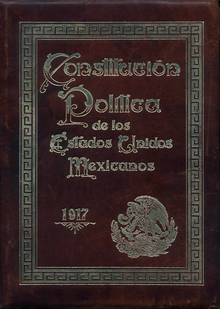1917 Constitution
| Political Constitution of the United Mexican States | |
|---|---|

Cover of the original copy of the Constitution
|
|
| Ratified | 5 February 1917 |
| Location | General Archive of the Nation in the Lecumberri Palace |
| Author(s) | Constituent Congress of 1917 |
| Signatories | Constituent Congress of 1917 |
| Purpose | National constitution to replace the Constitution of 1857 |
The Constitution of Mexico, formally the Political Constitution of the United Mexican States (Spanish: Constitución Política de los Estados Unidos Mexicanos) is the current constitution of Mexico. It was drafted in Santiago de Querétaro, in the State of Querétaro, by a constitutional convention, during the Mexican Revolution. It was approved by the Constitutional Congress on 5 February 1917. It is the successor to the Constitution of 1857, and earlier Mexican constitutions.
The current Constitution of 1917 is the first such document in the world to set out social rights, serving as a model for the Weimar Constitution of 1919 and the Russian Constitution of 1918. Some of the most important provisions are Articles 3, 27, and 123; adopted in response to the armed insurrection of popular classes during the Mexican Revolution, these articles display profound changes in Mexican political philosophy that helped frame the political and social backdrop for Mexico in the twentieth century. Aimed at restricting the Roman Catholic Church in Mexico, Article 3 established the basis for a free, mandatory, and secular education; Article 27 laid the foundation for land reforms; and Article 123 was designed to empower the labor sector, which had emerged in the late nineteenth century and which supported the winning faction of the Mexican Revolution.
Articles 3, 5, 24, 27, and 130 seriously restricted the Roman Catholic Church in Mexico, and attempts to enforce the articles strictly by President Plutarco Calles (1924–1928) in 1926 led to the violent conflict known as the Cristero War.
...
Wikipedia
